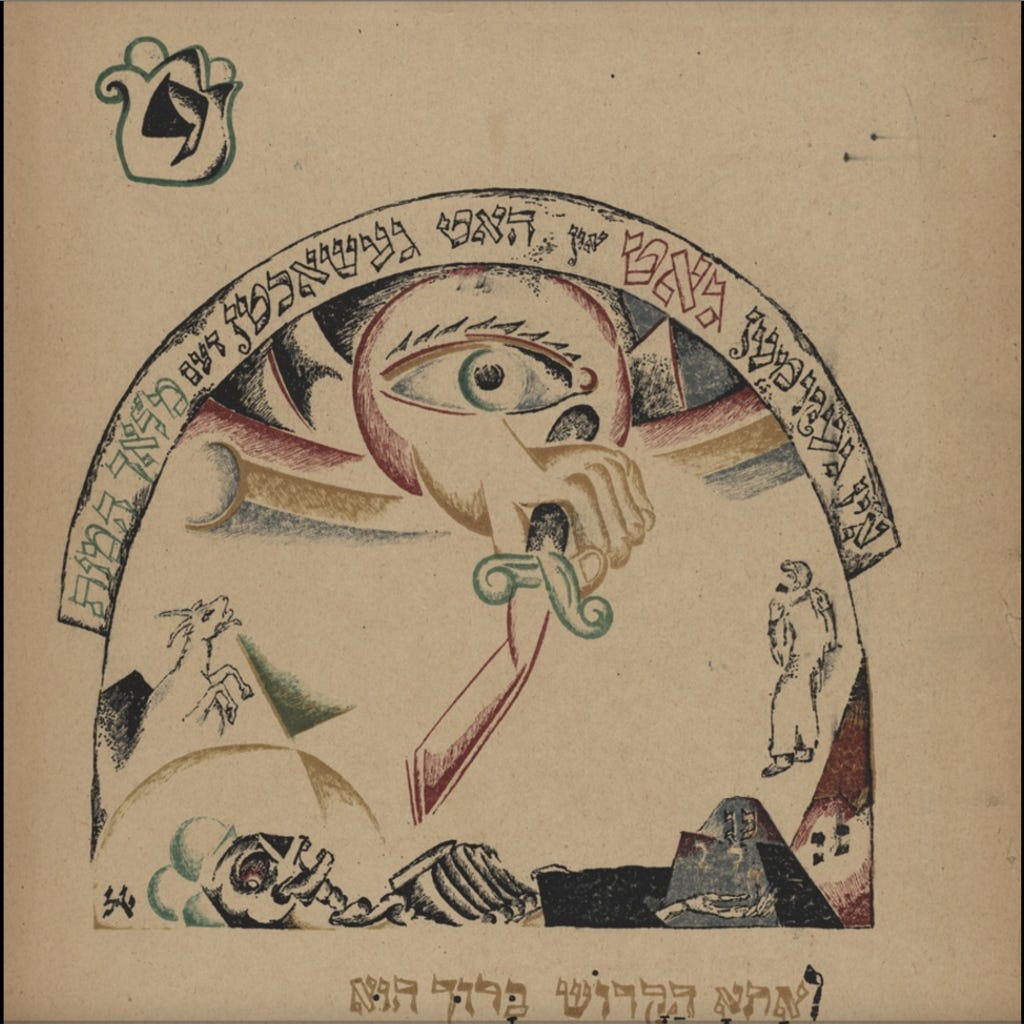Why is this Chad Gadya different from all the others?
How a song we sing at Passover registers differently this year
At Passover, we sing Chad Gadya, a silly but spooky song that children at the seder love.
It starts with a verse about a father buying a goat for two zuzim. As a kid, I loved thinking about those two zuzim, which, for some reason, I thought was the currency in Prague during the Middle Ages. My grandfather had given me a storybook about a boy in medieval Prague, and that's probably the source of my association.
The other thing I remember about Chad Gadya, which translates into "An Only Kid," as in a goat, is my dad heroically leading us through the song. It's a long song, requiring a lot of breath, because after the father buys the goat for two zuzim, the cat eats the goat. Then the dog bites the cat, a stick hits the dog, a fire burns the stick, water quenches the fire, and on and on. Each verse repeats all the previous verses, which forces the lead singer—in this case, my dad—to carry the rest of the singers (my mom, my sisters, and me) through ever longer renditions of the verses. The song finally ends with God, who kills the Angel of Death, who kills the butcher who kills the ox who drinks the water that quenches the fire...And on and on.
El Lissitzky, the great Soviet avant-garde artist, did a series of takes on Chad Gadya, only in images. His portraits used the song to celebrate the emancipation of the Jews through the Bolshevik Revolution. You can buy a book of the images, which are stunning.
The song is silly but spooky, as I said, because, for all the fun and forward motion, it's really about the violence of the universe. What saves the song, for children, from the scariness is that the violence ultimately stops with God, Blessed Be He (as the song goes), who, in one final act of violence, ends all the violence that has come before God. As much as it is a story about violence, so is it a story about the triumph of God over the violence of the universe.
In 1989, at the height of the First Intifada, Chava Alberstein, an Israeli singer and songwriter, rewrote and recast the song as a much more terrible parable of violence, pointing it directly at the Israeli state. Setting the song to a haunting melody, Alberstein ends Chad Gadya not with God, who is not present in her song at all, but in an endless cycle of violence.
One has to be careful around that phrase "cycle of violence." It's often a euphemism or code, particularly among right-think people, for avoiding the assignment of responsibility in situations where there is clearly one side with much greater power than the other. It attaches a note of tragic regret to that hierarchy of power but ultimately signals a kind of resignation before the larger forces of the universe.
Alberstein saves us from that connotation by starting the song with an innocent victim who morphs into a killer by the song's end. Then the song starts all over again.
Why are you singing Chad Gadya?
Spring hasn't come yet,
Passover isn't here.
And what has changed for you? What has changed?
I myself have changed this year.
...
Hunter and hunted, beater and beaten,
When will this madness end?
And what has changed for you? What has changed?
I myself have changed this year.
I used to be a kid and a peaceful sheep
Today I am a tiger and a ravenous wolf.
I've been a dove and I've been a deer,
Today I don’t know who I am.
It's hard not to think that the song is about how victims, like the Jews, become killers, like the IDF, and ultimately lose themselves in the violence. The song was initially banned by the IDF. Now, it's canon. But it still disrupts. Especially on Passover.
Pesach is a story about redemptive violence, and that, in a way, is that meaning of the traditional song Chad Gadya, the one last act of violence that ends the cycle of violence. In Alberstein's retelling, Chad Gadya becomes about the renewal of violence. Rather than freeing us, as the Pesach story tells us, violence controls us. We don't use it; it uses us.
A zissen Pesach to you all.




You talk about the Bolshevik Revolution as if it was not violent!
Anyway, Israel’s justified war in Gaza against insane terrorists who want to kill them is nothing new. Certainly it’s far less violent than the Bolshevik Revolution, or the allied bombings of Germany and Japan in World War II.
It seems that Sharon made a mistake in withdrawing from Gaza. Had he kept the IDF there, we wouldn’t have had 10/7 or the subsequent war.